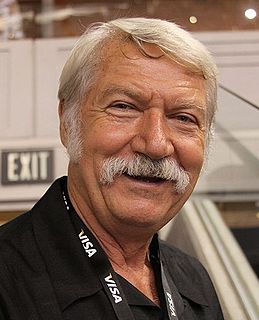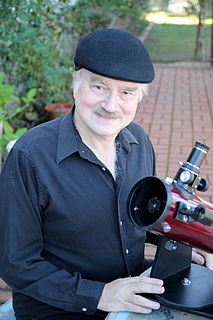A Quote by H. L. Mencken
The average man never really thinks from end to end of his life. The mental activity of such people is only a mouthing of cliches. What they mistake for thought is simply a repetition of what they have heard. My guess is that well over 80 percent of the human race goes through life without having a single original thought.
Related Quotes
Using any reasonable definition of a scientist, we can say that 80 to 90 percent of all the scientists that have ever lived are alive now. Alternatively, any young scientist, starting now and looking back at the end of his career upon a normal life span, will find that 80 to 90 percent of all scientific work achieved by the end of the period will have taken place before his very eyes, and that only 10 to 20 percent will antedate his experience.
A man never is happy, but spends his whole life in striving after something which he thinks will make him so; he seldom attains his goal, and when he does, it is only to be disappointed; he is mostly shipwrecked in the end, and comes into harbor with mast and rigging gone. And then, it is all one whether he has been happy or miserable; for his life was never anything more than a present moment always vanishing; and now it is over.
A purely mental life may be destructive if it leads us to substitute thought for life and ideas for actions. The activity proper to man is purely mental because man is not just a disembodied mind. Our destiny is to live out what we think, because unless we live what we know, we do not even know it. It is only by making our knowledge part of ourselves, through action, that we enter into the reality that is signified by our concepts.
Happily for me, ninety-nine percent of all human life is spent simply repeating the same old actions, speaking the same tired clichés, moving like a zombie through the same steps of the dance we plodded through yesterday and the day before and the day before. It seems horribly dull and pointless-but it really makes a great deal of sense. After all, if you only have to follow the same path every day, you don't need to think at all. Considering how good humans are at any mental process more complicated than chewing, isn't that the best for everybody?
Envy and resentment are terribly corrosive passions. To suffer at the sight or even the thought of others' enjoyment of life makes one a committed enemy of human happiness. Such people end up being practically a curse upon the human race. They vandalize life, exerting themselves not in the pursuit of gain or pleasure, but to hinder others' enjoyment.
There is a thinking stuff from which all things are made, and which, in its original state, permeates, and fills the inter spaces of the universe.
A thought in this substance, Produces the thing that is imaged by the thought.
Man can form things in his thought, and by impressing his thought upon formless substance, can cause the thing he thinks about to be created.
If I get to the end of my life, and people say, 'He was in 'Cold Feet,' well, I was, and it was great. I thought the fourth series wasn't great. I thought there were weak episodes throughout. Overall, I thought it was a good show, it had an impact, it dealt with a lot of issues, and it was a great part.
Beware of clichés. Not just the clichés that Martin Amis is at war with. There are clichés of response as well as expression. There are clichés of observation and of thought - even of conception. Many novels, even quite a few adequately written ones, are clichés of form which conform to clichés of expectation.
I thought about the earth then, really thought about it, the tsunami's and earthquakes and volcanoes, all the horrors I haven't witnessed but have changed my life, the lives of everyone I know, all the people I'll never know. I thought about life without the sun, the moon, stars, without flowers and warm days in May. I thought about a year ago and all the good things I'd taken for granted and all the unbearable things that had replaced those simple blessings. And even though I hated the thought of crying in from of Syl, tears streamed down my face.



































